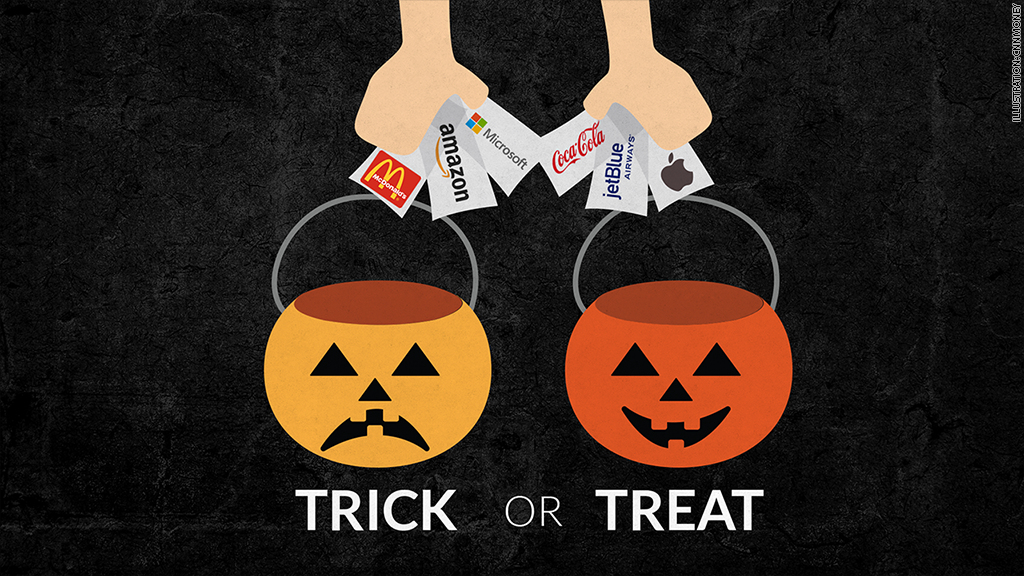
For a stock market that's effortlessly climbed higher for years, the past month has felt like something ripped out of a Hollywood horror film.
Frightening plot twists like plunging oil prices and the Ebola outbreak teamed up with ghosts from the past (Greece, deflation jitters in Europe) to create a toxic mix of market scares.
Last week even featured a few quasi-heroes like strong quarterly report cards from corporate giants like General Electric (GE) and Morgan Stanley (MS) and the Federal Reserve official who calmed the panic by suggesting additional stimulus could be possible if the economy deteriorates.
When the dust finally settled, the Dow was left in a 1% hole for the year. The S&P 500 is up about 2% in 2014, but well off its all-time high.
So what's going to determine whether this week is another scary ride or something far more tame?

Sure, investors will continue paying attention to what's kept them awake at night like Ebola and Europe. But they'll also get the chance to hear from a massive parade of companies expected to reveal decent quarterly numbers, including Amazon.com (AMZN), Apple (AAPL), Coca-Cola (KO), General Motors (GM) and McDonald's (MCD).
Related: Time to shop 'til you drop for cheap stocks
"Focusing on fundamentals is the best way for investors to avoid fear and to stay positioned for long-run growth," James Liu and David Lebovitz, global market strategists at JPMorgan Funds, wrote in a recent note to clients.
iPhone to the rescue? Apple could give Wall Street 21 million reasons to feel better this week. That's roughly the number of iPhones analysts expect Apple to say it sold last quarter (thanks in part to the iPhone 6), helping to drive a whopping $40 billion in total sales.
As the world's largest company, Apple always plays an outsize role in impacting stock prices and market sentiment. Positive numbers from the tech behemoth on Monday evening could reinforce cautious optimism about the U.S. economy and ease jitters about growth overseas.
Related: Apple unveils new iPads
A big earnings beat could also help breathe new life into Apple's shares, which have retreated 5% from all-time highs amid the recent market slump. It could also boost shares of AT&T (T) and Verizon (VZ), two wireless companies that carry the iPhone and are also due to report results this week.
Are consumers still spending? But it's not just about Apple. A number of other consumer-facing tech companies are also on the earnings docket this week like Amazon.com, Microsoft (MSFT) and Pandora (P). Don't forget about Yahoo (YHOO) and its efforts to lure more eyeballs to its growing family of sites.
There are also a long line of non-tech consumer companies slated to release results this week like Chipotle (CMG), Coca-Cola, Hasbro (HAS), McDonald's and Six Flags (SIX). An update on the pivotal auto market is also on tap in the form of earnings reports from both Ford (F) and General Motors.
If the recent economic data are any sign, these companies will have positive things to say about the health of spending. Consumer sentiment in October has ticked up to the highest level since 2007, according to the University of Michigan sentiment survey.
Concerns about the spread of Ebola added to the negative market sentiment last week, helping drive down travel stocks amid fears consumers would stop traveling. But they bounced off their recent lows as Delta Air Lines (DAL) said concerns about the outbreak haven't impacted travel.
Investors are hoping to hear more soothing words about the Ebola fallout from American Airlines (AAL), JetBlue (JBLU), Royal Caribbean (RCL) and Southwest Airlines (LUV).
Related: Can you protect yourself from a market crash?
Ebola, global growth: Wall Street will be searching for clues about how Corporate America is grappling with slowing overseas growth and the stronger U.S. dollar, which hurts exports.
General Electric (GE) and Honeywell (HON) offered positive news on this front last week, and this week it's 3M (MMM), Boeing (BA) and Dow Chemical's (DOW) turn to hit the earnings stage.
A gut check on the economy will also be available from a number of economic gauges, highlighted by a pair of housing reports on existing and new home sales.


